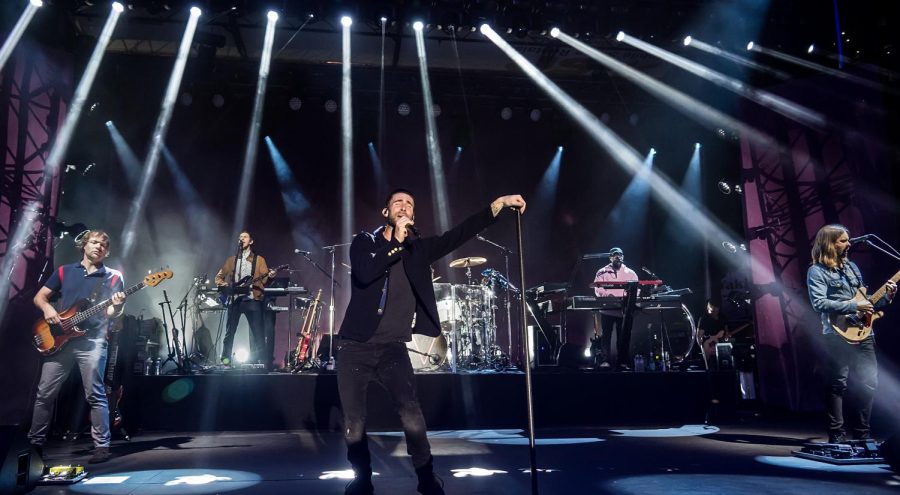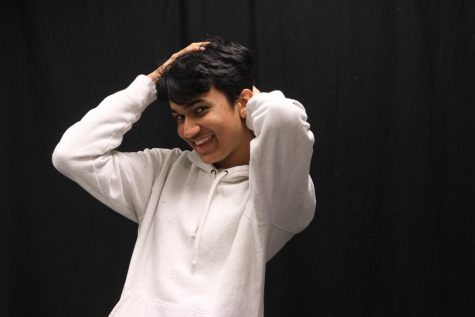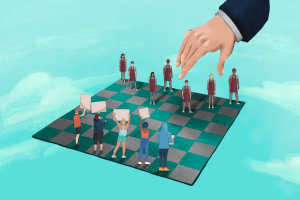Did Maroon 5 miss the beat?
Students speak up on the Super Bowl halftime show controversy
March 14, 2019
It is time for the Super Bowl LIII halftime show, and eyes across the nation are glued to their screens. What was once an event characterized by excitement is now wrought with tension as viewers anticipate what will happen next. As Maroon 5’s lead singer Adam Levine takes center stage, some sigh with relief while others turn off their television sets in frustration.
What caused such a mixed reaction from the public? The answer lies all the way back in 2016, when Colin Kaepernick, then a quarterback for the San Francisco 49ers, knelt during the national anthem after a football game in order to protest racial discrimination in the U.S. After continuing the protest over a period of almost a year, Kaepernick was essentially barred from playing in any future games by the NFL in 2017. This was met with outrage from millions of viewers, and celebrities such as Rihanna and Jay-Z began boycotting performances at the halftime show to voice their support for Kaepernick. So when thousands of viewers signed a petition in favor of Maroon 5 canceling its Super Bowl performance, the band’s choice to perform anyway made controversy inevitable. The issue was only exacerbated by the fact that the host city, Atlanta, missed out on showcasing its rich hip-hop musical culture during Black History Month due to the band’s choice to perform. Here is what Lynbrook students have to say on the issue.
- Before the halftime show, what opinion did you have about Maroon 5’s decision to perform at the Super Bowl?
- Freshman Bennie Chang: I had mixed feelings about the band’s choice to perform. Although I love its music, I knew that it was overlooking a much more important cause in choosing to perform. However, although it did ignore the continuing protest of millions of people who are racially discriminated against in the country, as well as the people of Atlanta who were disregarded from the performance, I don’t think we as viewers should blame the band completely since performing at the Super Bowl halftime show is such a big opportunity for musical artists.
- Sophomore Hanzen Shou: I disagreed with Maroon 5’s decision right from the beginning. Simply put, its decision was very ignorant, especially considering the fact that so many other celebrities were conscious enough to boycott the performance.
- Junior Akhil Aggarwal: From the beginning, I thought that the band’s decision should not have been strictly scrutinized, because at the end of the day, its decision to perform at the halftime show presented an opportunity for growth for the band and a platform to popularize its music.
- Senior Irene Chu: I’m a big fan of Maroon 5’s music, and I was really excited to know that it would perform. But I wasn’t really aware of the controversy at the time.
- How did your opinion change after watching the performance and after hearing Adam Levine’s statement, in which he said that the controversy was inevitable considering his profession as a musician?
- Chang: At first, I felt a little uncomfortable, but after hearing [Levine’s] justification, I better understood his own point of view. It was his responsibility to perform, not to engage in some kind of protest. With that said, I think it would have been much more of a positive reflection on himself if he had acknowledged the actual issue of racial discrimination in the very least.
- Shou: Adam Levine’s statement seemed like a weak excuse for a poor decision. I think it is pretty clear to all viewers that in making the decision to perform, Maroon 5 cared far more for publicity than actually helping a social cause.
- Aggarwal: My opinion stays the same. Fans should not be upset by Maroon 5’s decision to perform because this helps grow the band although, yes, the NFL has made some ethically questionable decisions in the past. If one is saying that it is wrong to perform at the halftime show, then he or she is thereby insinuating that the majority of Americans who watch the Super Bowl are committing a wrongdoing simply by watching the show themselves.
- Chu: After talking with some of my friends after the performance, I felt really hurt and tried to defend the band. After I think about it more, though, I think I was upset that these people who I looked up to so much made a decision that wasn’t very well-informed.
- What do you think of the fact that musicians in Atlanta missed out on representation as a result of Maroon 5’s performance?
- Chang: I don’t have a strong opinion on that because the Super Bowl is more of a national event than anything else. I don’t think it needs to have any connection to the host city.
- Shou: It would have been great for the host city to see some representation from its local artists. Even so, I don’t see this as a huge deal since the halftime show has never really been about showcasing local talent.
- Aggarwal: I think the band’s opportunity to expand its platform outweighs any form of representation here, considering how big of an event the Super Bowl is.
- Chu: I feel that the Atlantan musicians must have been disappointed but hope they get to perform next time!
- What do you think of Colin Kaepernick’s protest? What about the NFL’s decision to ban him?
- Chang: Colin Kaepernick’s protest was very admirable, and I think the NFL should not have had the authority to remove him from play.
- Shou: Colin Kaepernick’s protest was well-executed and helped create a stir about important issues among viewers. Very few celebrities have the courage to protest as fearlessly as Kaepernick did, regardless of the consequences. It was in poor taste that the NFL essentially removed him from future games.
- Aggarwal: I think that Colin Kaepernick’s protest had a good message, and he was very clever in the way he got across his message. I understand the NFL’s decision to remove him from the field permanently as well, however, because it needs to preserve its conservative-leaning fanbase.
- Chu: Colin Kaepernick’s intentions were good, but there are better ways of getting your message across without potentially coming across as disrespectful, especially when you’re a celebrity and already have influence of your own.
- What responsibilities do you think celebrity artists have in supporting people like Kaepernick, if any at all?
- Chang: I don’t think celebrities should have any responsibility in helping further agendas, but they should definitely speak out on issues they are genuinely passionate about. I think Maroon 5’s attitude in this situation was a little too ignorant considering what the public was asking for, though.
- Shou: When it comes to an issue as big as this one, celebrities need to know the consequences of their actions. They need to be held accountable for what they do; after all, with fame comes immense responsibility.
- Aggarwal: Why should they? In this kind of situation, artists should focus on their own careers rather than some disconnected issue that could potentially harm their own careers. For Maroon 5 to ascend to a fanbase comparable to those of Bruno Mars or Beyonce, both of whom have performed at the halftime show several times, this was the only way to reach such an end, thereby justifying the means.
- Chu: Celebrities should be always be positive role models for their fans. This means that they should always take stances on issues that need support, like this one. While I don’t agree completely with how Kaepernick got his message across, I think his cause really needs more support in the country, and Maroon 5’s support would have been a huge help.
- Do you think there will be long-term consequences as a result of this controversy, either on the band or on Kaepernick himself?
- Chang: These things blow over, and I think Maroon 5 won’t be held in contempt for too long. As for Kaepernick, I think this doesn’t make much of a difference to his situation.
- Shou: Maroon 5’s selfish choice to perform will undoubtedly weaken the effect of Kaepernick’s protest. As for the band itself, it has scarred its name permanently, to say the least.
- Aggarwal: Controversies always happen. I think it will raise publicity for both parties involved, but won’t do too much more. After all, Maroon 5 has simply performed; it hasn’t actually taken an official stance on the Kaepernick issue.
- Chu: I think the amount of support that Kaepernick got as a result of the Maroon 5 controversy will definitely benefit his movement. The band itself made headlines because of this, which I think will just help increase its public image all the more in spite of the controversy it has raised.
- If you were in the band, would you have reacted differently? How so?
- Chang: I think I would have personally chosen not to perform, simply because the issue of racial inequality is something I relate to, much like Kaepernick. However, I think that Maroon 5’s own values as a group are different and so should not equate with my own.
- Shou: I definitely would not have wanted to perform. Doing so would be a blatant offense to those for whom Kaepernick protested in the first place, and I don’t think any amount of fame amounts to that kind of trouble.
- Aggarwal: I would have done it the same way Maroon 5 did. Really, a show that racks up more than 100 million views in all should not be ignored just to make a political statement.
- Chu: I would have performed but given out a statement before the performance directed at the NFL. We can still disagree with some aspects of an entity without boycotting it completely. After all, this is the Super Bowl halftime show. It’s a big deal! Turning it down is not something one should take lightly.
- In what ways do you think protests during sports games reflect the American political condition as a whole?
- Chang: I don’t see this as a political issue. I think this is more linked to the social tensions in the U.S. right now.
- Shou: It shows that our whole political structure is falling apart. You know that something is wrong when your sports players are making more change than your actual lawmakers.
- Aggarwal: It was completely political. Actually, the Colin Kaepernick issue was because the NFL knew that in order to preserve its conservative fanbase, it had to remove Kaepernick from future games. There was a lot of anger toward Kaepernick from the right wing, since it saw kneeling as disrespectful to veterans. People who support Kaepernick’s protest tend to be more liberal, which is why the controversy has ended up being a Democrat-Republican conflict in disguise.
- Chu: I think this issue is just a simple reflection of the growing divide between the political factions in the country.
- What steps do you think that NFL players like Kaepernick and performing artists like Levine should take in the future to avoid such conflict among viewership? Is it necessary to prevent such conflict?
- Chang: I think it’s important to listen to what your fans want, while also staying aligned with your own values. I don’t think conflict can always be avoided, but it can definitely be minimized this way.
- Shou: It is absolutely necessary to avoid conflicts such as this one. I think Maroon 5 has learned its lesson well after this incident: know the impact making a controversial decision can have on your fanbase. As a rule of thumb, celebrities should avoid meddling with issues that they clearly have no involvement with.
- Aggarwal: Conflict is inevitable. Choose the opportunities that are best-suited to your career; no controversy can last forever.
- Chu: Prepare better for controversies. As fans, we expect you to clean up your messes before they get out of hand. Don’t disappoint us!
Even as viewers learn about the reasons why Maroon 5 decided to perform in spite of public outcry, the conflict between avid supporters and dissenters remains heated. Only time will tell how this decision will affect the band’s popularity, for better or for worse.




























































